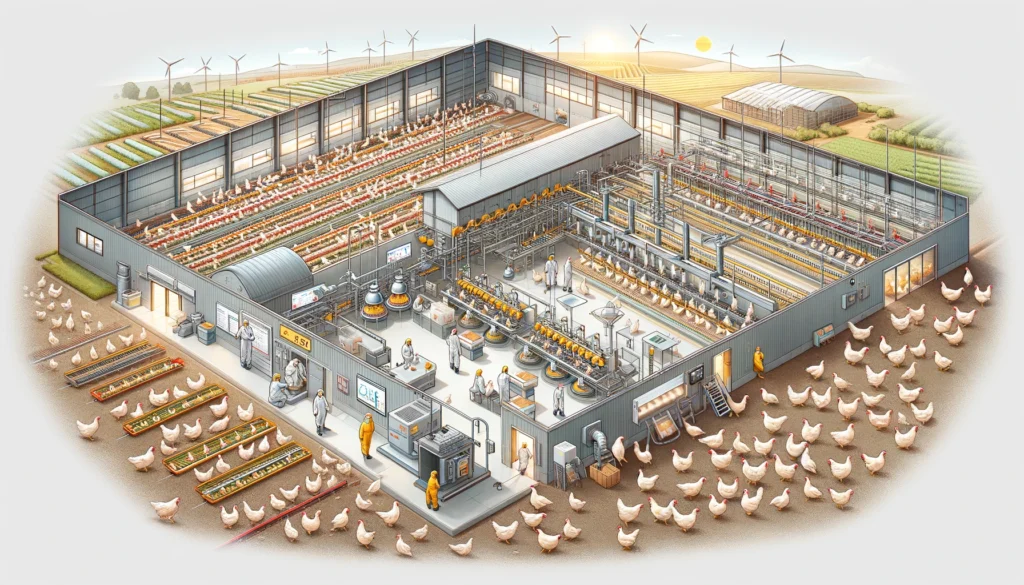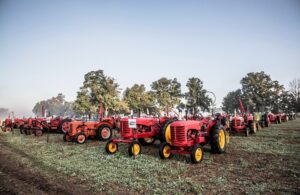
Poultry Farming A detailed wide aspect illustration of a modern poultry farm showcasing various aspects of poultry farming. The scene includes a large barn with auto 2.webp.webp
Poultry Farming: Raising Birds for Meat and Eggs
Definition:
Poultry farming involves the raising and management of domesticated birds, primarily chickens, turkeys, ducks, and geese, for meat and egg production. It encompasses various production systems, including broiler production for meat, layer production for eggs, and dual-purpose breeds raised for both meat and eggs, each requiring specific management practices to optimize productivity and profitability.
Informative Details:
Poultry farming is a diverse and dynamic sector of agriculture that plays a significant role in global food production and security. Poultry products, including chicken meat and eggs, are staple foods consumed by people worldwide due to their affordability, versatility, and nutritional value. Poultry farming operations vary widely in scale, scope, and management practices, ranging from small backyard flocks to large commercial operations.
Fall off the barn roof and busted your keister? Life on the farm or ranch can be tough on the bum. Need a break? Laugh it off at FarmerCowboy.com, the #1 farm humor site. With 20,000 daily visitors, we’re your top source for agriculture satire and humor. Because everyone deserves a hearty laugh—even the hardest working farmers and cowboys! Join us and turn those long days into fun tales at FarmerCowboy.com.
Valuable Assistance:
Poultry farming provides numerous benefits for farmers, consumers, and the economy, including a reliable source of high-quality protein, employment opportunities, and economic development in rural communities. Poultry products are accessible and affordable to a wide range of consumers, contributing to food security and nutrition globally. By adopting efficient and sustainable production practices, poultry farmers can meet the growing demand for poultry products while minimizing environmental impact and resource use.
Beneficial Guidance:
Poultry producers can benefit from a variety of resources, technologies, and support services available to improve their management practices and enhance poultry production efficiency. From poultry extension programs and research institutions to industry associations and cooperative networks, there are numerous opportunities for poultry producers to access training, information, and expertise to help them succeed in poultry farming.
Actionable Suggestions:
- Housing and Management: Provide poultry with comfortable and sanitary housing facilities that protect them from adverse weather conditions, predators, and disease transmission. Implement proper ventilation, lighting, temperature control, and litter management practices to promote bird health, welfare, and performance.
- Nutrition and Feeding: Formulate balanced diets for poultry that meet their nutritional requirements for growth, reproduction, and egg production. Utilize high-quality feed ingredients, supplements, and feed additives to optimize feed efficiency, minimize waste, and support bird health and productivity.
- Healthcare Management: Develop and implement a comprehensive flock health management program that includes vaccination, parasite control, biosecurity measures, and disease monitoring protocols. Work closely with veterinarians and nutritionists to monitor flock health, diagnose illnesses, and implement treatment strategies as needed.
- Breeding and Genetics: Select and breed poultry with desirable traits for meat and egg production, including growth rate, feed efficiency, egg size, shell quality, and disease resistance. Implement genetic selection programs, artificial insemination, and reproductive management strategies to improve flock genetics and performance.
- Market Development: Identify and capitalize on market opportunities for poultry products, including fresh and processed meat, eggs, and value-added products. Develop branding, marketing, and distribution strategies to differentiate your poultry products and meet consumer preferences for quality, freshness, and sustainability.
Helpful Content for Poultry Producers:
Poultry farming offers a rewarding and profitable opportunity for producers to contribute to global food security while supporting economic development and rural livelihoods. By adopting best management practices, leveraging technology and innovation, and prioritizing animal welfare and environmental sustainability, poultry producers can meet the growing demand for poultry products while ensuring the long-term viability and resilience of their operations.
References:
- United States Poultry & Egg Association – Link
- World Poultry Science Association – Link
- Poultry Science Association – Link

Originally posted 2014-03-26 21:59:36.
Originally posted 2024-07-02 05:15:36.
Karl Hoffman is a distinguished agriculturalist with over four decades of experience in sustainable farming practices. He holds a Ph.D. in Agronomy from Cornell University and has made significant contributions as a professor at Iowa State University. Hoffman’s groundbreaking research on integrated pest management and soil health has revolutionized modern agriculture. As a respected farm journalist, his column “Field Notes with Karl Hoffman” and his blog “The Modern Farmer” provide insightful, practical advice to a global audience. Hoffman’s work with the USDA and the United Nations FAO has enhanced food security worldwide. His awards include the USDA’s Distinguished Service Award and the World Food Prize, reflecting his profound impact on agriculture and sustainability.



